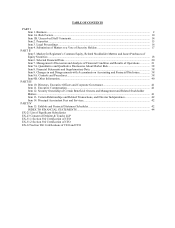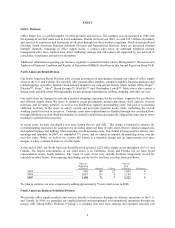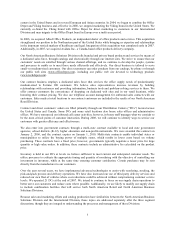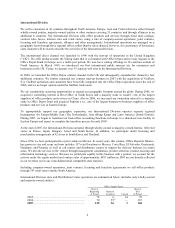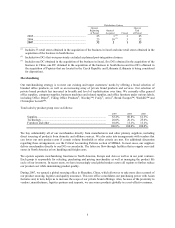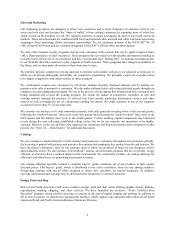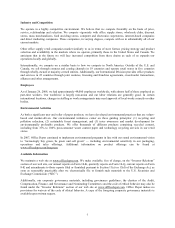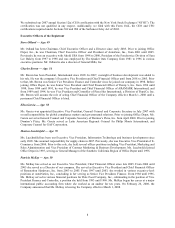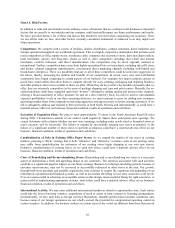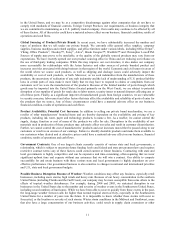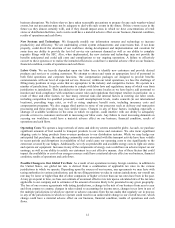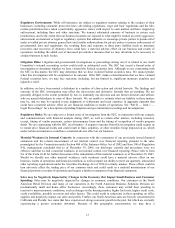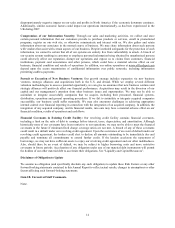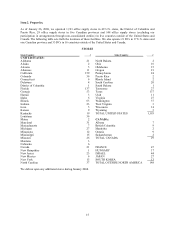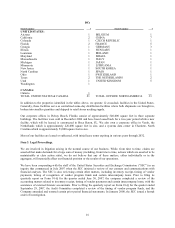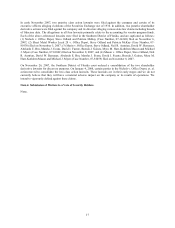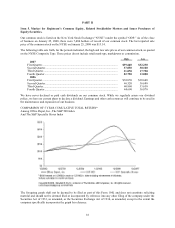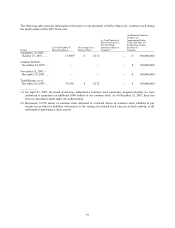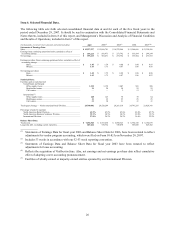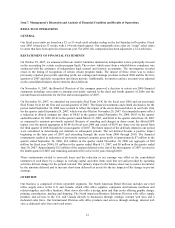Office Depot 2007 Annual Report Download - page 13
Download and view the complete annual report
Please find page 13 of the 2007 Office Depot annual report below. You can navigate through the pages in the report by either clicking on the pages listed below, or by using the keyword search tool below to find specific information within the annual report.11
in the United States, and we may be at a competitive disadvantage against other companies that do not have to
comply with standards of financial controls, Foreign Corrupt Practices Act requirements, or business integrity that
we are committed to maintaining as a U.S. publicly traded company. Our results may continue to be affected by all
of these factors. All of these risks could have a material adverse effect on our business, financial condition, results of
operations and cash flows.
Global Sourcing of Products/Private Brand: In recent years, we have substantially increased the number and
types of products that we sell under our private brands. We currently offer general office supplies, computer
supplies, business machines and related supplies, and office furniture under various labels, including Office Depot®,
Viking Office Products®, Niceday™, Foray®, Ativa®, Break Escapes™, Worklife™ and Christopher LowellTM.
Sources of supply may prove to be unreliable, or the quality of the globally sourced products may vary from our
expectations. We have recently opened our own product sourcing office in China and are reducing our reliance on
the use of third-party trading companies. While this may improve our cost structure, it also makes our company
more accountable for relationships with the Asian factories and other sources of private branded product and
increases our risks associated with doing business in that region of the world. Economic and civil unrest in areas of
the world where we source such products, as well as shipping and dockage issues could adversely impact the
availability or cost of such products, or both. Moreover, as we seek indemnities from the manufacturers of these
products, the uncertainty of realization of any such indemnity and the lack of understanding of U.S. product liability
laws in certain parts of Asia make it more likely that we may have to respond to claims or complaints from our
customers as if we were the manufacturer of the products. Because of the limited number of ports through which
goods may be imported into the United States (located primarily on the West Coast), we are subject to potential
disruption of our supplies of goods for resale due to labor unrest, security issues or natural disasters affecting any or
all of these ports. Finally, as a significant importer of manufactured goods from foreign countries, we are vulnerable
to security concerns, labor unrest and other factors that may affect the availability and reliability of ports of entry for
the products that we source. Any of these circumstances could have a material adverse effect on our business,
financial condition, results of operations and cash flows.
Product Availability; Potential Cost Increases: In addition to selling our private brand merchandise, we are a
reseller of other manufacturers’ branded items and are thereby dependent on the availability and pricing of key
products, including ink, toner, paper and technology products, to name a few. As a reseller, we cannot control the
supply, design, function or cost of many of the products we offer for sale. Disruptions in the availability of raw
materials used in production of these products may adversely affect our sales and result in customer dissatisfaction.
Further, we cannot control the cost of manufacturers’ products and cost increases must either be passed along to our
customers or result in an erosion of our earnings. Failure to identify desirable products and make them available to
our customers when desired and at attractive prices could have a material adverse effect on our business, financial
condition, results of operations and cash flows.
Government Contracts: One of our largest clients currently consists of various state and local governments, a
relationship, which is subject to uncertain future funding levels and federal and state procurement laws and requires
restrictive contract terms; any of these factors could curtail current or future business. Contracting with state and
local governments is highly competitive and can be expensive and time-consuming, often requiring that we incur
significant upfront time and expense without any assurance that we will win a contract. Our ability to compete
successfully for and retain business with these various state and local governments is highly dependent on cost-
effective performance. Our government business is also sensitive to changes in national and international priorities
and U.S., state and local government budgets.
Possible Business Disruption Because of Weather: Weather conditions may affect any business, especially retail
businesses, including snow storms, high winds and heavy rain. Because of our heavy concentration in the southern
United States (including Florida and the Gulf Coast), our company may be more susceptible than some others to the
effects of tropical weather disturbances. For example, during 2004 and 2005, we sustained disruption to our
businesses in the United States due to the number and severity of weather events in the Southeastern United States,
including record numbers of hurricanes. While we have been able to recover quickly from these events in the past,
the long-range weather forecast calls for higher than normal tropical storm activity, especially in the Southeastern
United States for a number of years into the future. It is impossible to know whether these storms will occur as
forecasted, or the location or severity of such storms. Winter storm conditions in the Midwest and Southwest, areas
that also have a large concentration of our business activities, could result in supply chain constraints or other


